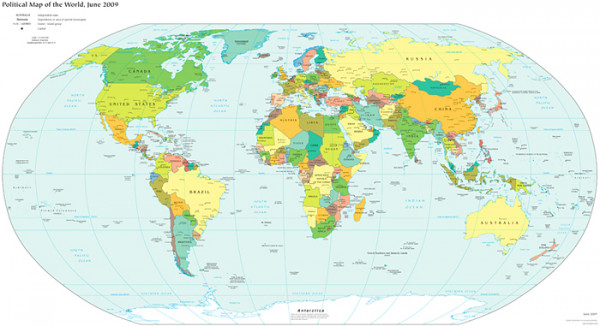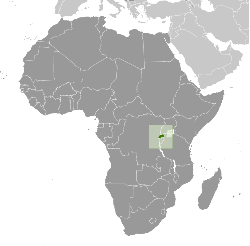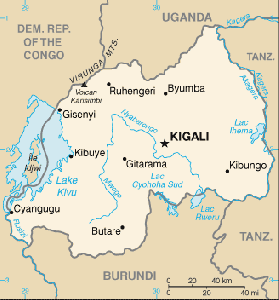Rwanda
Overview
| Flag |
|
| Anthem |
Rwanda nziza (Beautiful Rwanda) |
| Capital |
Kigali |
| Largest city |
Kigali |
| Official language(s) |
Kinyarwanda / French / English |
Demonyma name for a resident of a locality, often the same as the name of the people's native language
|
Rwandan, Rwandese |
| Government |
Republic |
| Area |
26,338 km2, 10,169 sq mi |
| Population |
~ 11 million |
| Currency |
Rwandan franc (RWF) |
| Internet TLD |
.rw |
Geography
Rwanda is a
landlockeda term used to refer to a region, especially a country, that does not border the sea country in Africa. It borders Uganda to the north, Tanzania to the east, Burundi to the south and the Democratic Republic of the Congo to the west.
The largest cities in Rwanda are Kigali, Gitarama and Butare. Kigali is also the capital of the country with an estimated population of 965,398. The city is situated near the geographic centre of the nation.
Society and culture
Unlike many countries in Africa, Rwanda has only one ethnic group and therefore a
sharedused by more than one person cultural
heritagehaving a certain background and traditions. Music and dance are an
integralconstituting a whole together with other parts or factors part of Rwandan culture.
Population
In 2010, Rwanda's population was estimated to be 10,746,311. This population is young: around 42.7% are under 15 years old. The
life expectancystatistical chances of survival is 56.77 years. There is only one ethnic group in Rwanda: the Banyarwanda. This group froms three
separatenot connected to or attached to anything else groups: the Hutus, the Tutsis and the Twas. These groups share a
commonshared by more than one history, culture and language.
Languages
There are three official languages in Rwanda: Kinyarwanda, English and French. English is the language of
instructionthe teaching of knowledge in all schools. The country's
principalmost important in a group language, however, is Kinyarwanda. It is spoken by most Rwandans. Also, Swahili, the
lingua francaa common language used by people of diverse backgrounds to communicate with one another of East Africa, is widely spoken in rural areas.
Religion
Most Rwandans are Christian. As of 2006, Catholics represented 56.5% of the poulation, Protestants 37.1% and Muslims 4.6%. 1.7%
claimedto state a new fact to have no religious beliefs.
Government and politics
Rwanda is a presidential republic. It is based upon a multi-party system. The current President of Rwanda is Paul Kagame. He is the head of state. Moreover, he commands the
armed forcesthe military forces of a nation, such as the army, navy, air force and marines. The Parliament, which consists of two chambers, makes
legislationthe preparation and enactment of laws. Rwanda is the only country with a female
majoritymore than half (50%) of a group parliament. Rwanda's legal system is largely based on German and Belgian
civil lawthe body of law dealing with the private relations between members of a community systems.
Economy
Rwanda is a country of few
natural resourcesany source of wealth that occurs by nature, especially minerals, fossil fuels, etc.. The economy is mostly based on agriculture by local farmers. Major export markets include China, Germany and the United States. Coffee and tea are exported the most. The industrial sector is small.
Abundantin great quantity wildlife, including rare mountain gorillas, have led to a fast-growing tourism sector. Nevertheless, large numbers of Rwandans live in
povertythe state of having no money.






